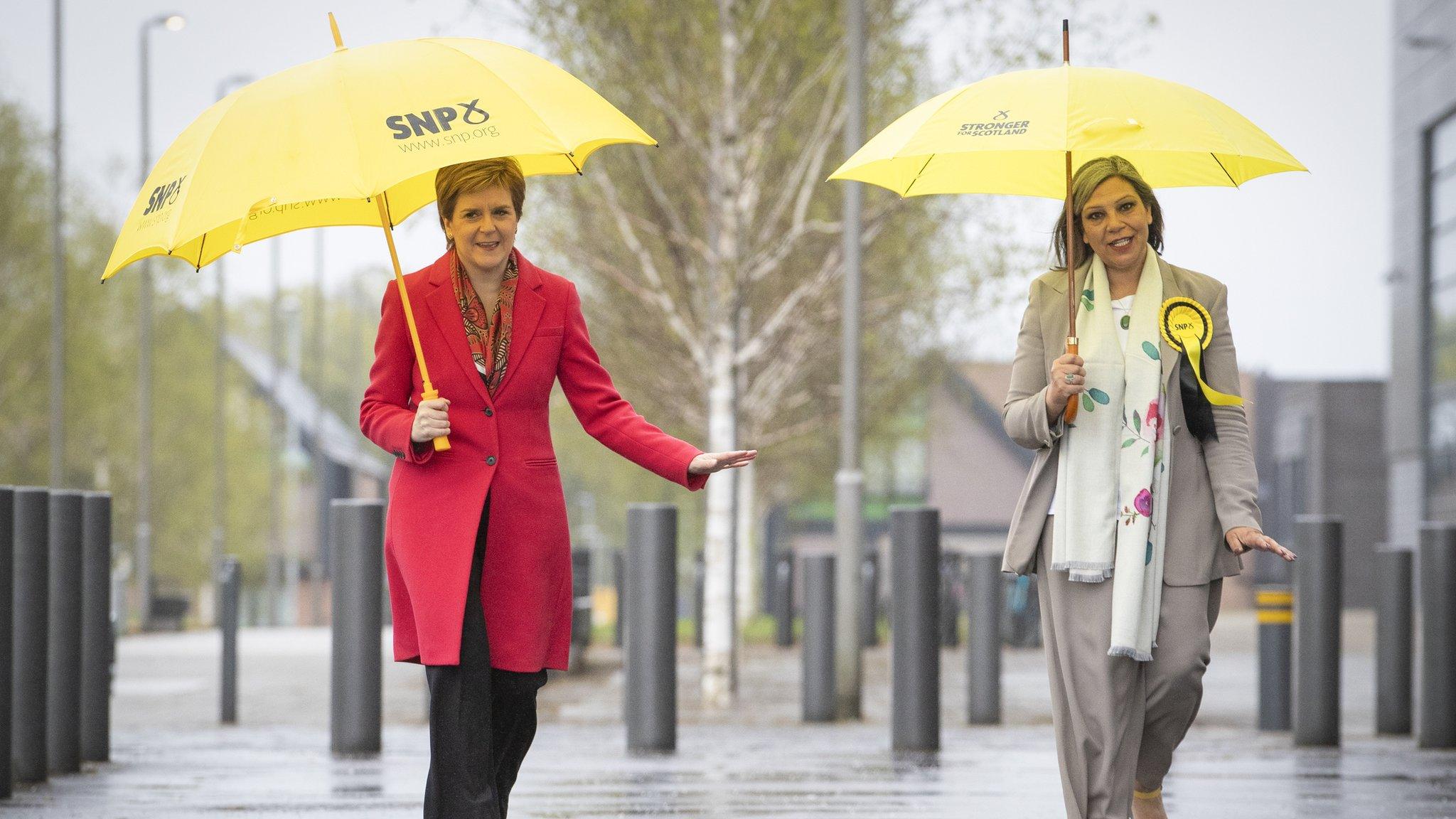New political line-ups for the parliamentary season ahead
- Published
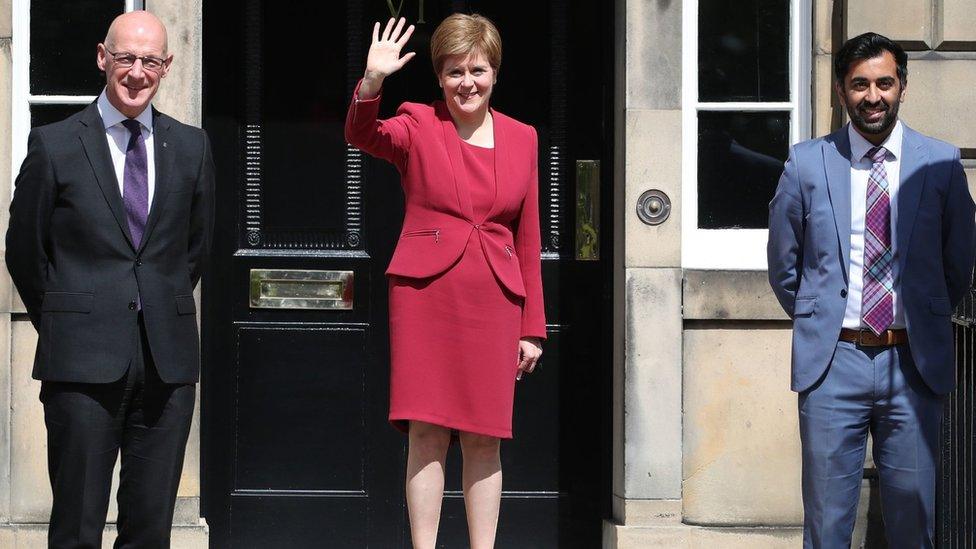
Ms Sturgeon unveiled her new cabinet team on the steps of her official Bute House residence in Edinburgh
They are "absolutely itching to get to work" according to the first minister - and now they can.
Two weeks after the Holyrood election Nicola Sturgeon's new ministerial team has been formally approved by parliament.
It's taken until now because MSPs had to be sworn in to office and Ms Sturgeon officially re-appointed by both parliament and the Queen.
Those formalities complete, the SNP leader has reshuffled her team.
This has produced a slimmed down cabinet of 10 rather than 12 members.
Two of the biggest jobs have gone to ministers she has previously named as being among those who might one day succeed her.
Humza Yousaf is now in charge of health and social care with responsibility for clearing the large NHS treatment backlog and creating a new national care service.
Kate Forbes adds economy to her finance brief at a time when many jobs and businesses are under threat - a situation likely to worsen when furlough and other Covid support dries up.
Both ministers have been given challenging roles in which to prove their capabilities. They will not have to look hard for political hazards along the way.
Bulging in-tray
The same can be said of the new education secretary, Shirley-Anne Somerville, who has the unenviable task of trying to close the attainment gap after the disruption of Covid.
She will also have to manage the fall out from awarding school qualifications without exams for the second year in a row, and respond to the OECD review of the curriculum to be published in June.
As the former Conservative leader Jackson Carlaw noted wryly, the minister's initials are SAS and special forces-style tenacity may be necessary to succeed in this difficult assignment.
Ms Somerville has replaced John Swinney at education although he will retain some oversight of the brief in his new role as cabinet secretary for Covid recovery.
This position combined with that of deputy first minister is billed as the biggest job in government and when you look at the list of his responsibilities you can see why.
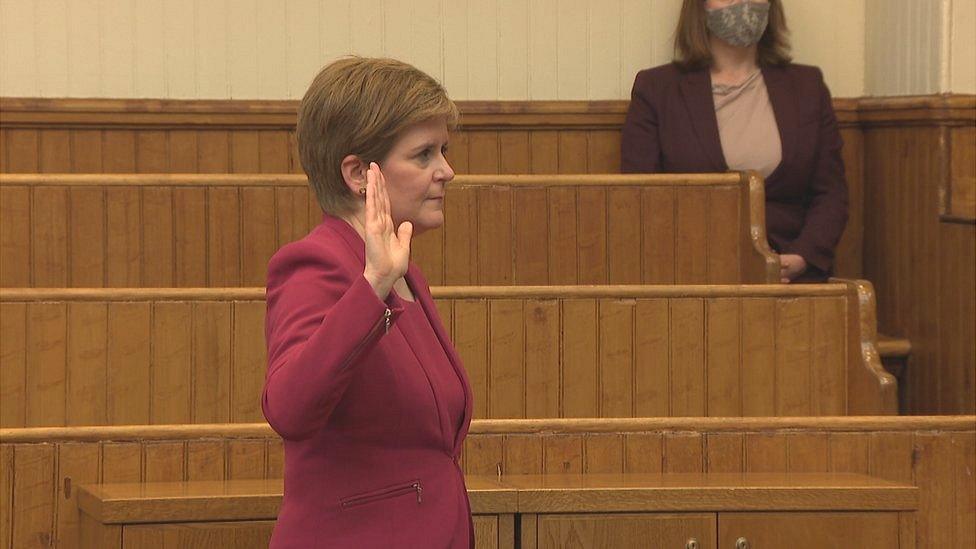
Ms Sturgeon was sworn in as first minister in a ceremony at the Court of Session on Wednesday
Mr Swinney is in charge of delivery and outcomes across all portfolios as well as coordination of pandemic recovery work, government strategy, public service reform and inter-governmental relations.
There is literally no area of government business in which he cannot be involved. He is minister for almost everything. A sort of cabinet enforcer.
Relations with the UK government are entering a particularly sensitive period with a review of the fiscal framework - how Holyrood is funded - due soon and arguments over a second independence referendum to come.
It's not clear how much of the negotiating will be shared with the new constitution, external affairs and culture secretary, Angus Robertson.
He has gone straight into cabinet as a newly elected MSP but has two decades of experience in frontline politics having been an MP and the SNP's deputy leader and Westminster group leader.
Mr Robertson is another potential leadership contender although in the short term, should a vacancy arise, Mr Swinney looks best placed to take over.
Having said that, the first minister has just won an election promising to serve a full term so she is not likely to trigger a contest anytime soon.
She still aspires to lead Scotland to independence, promising this week not to bludgeon her way there but to pursue another referendum with "responsibility, humility, and only when the crisis of Covid has passed".
Her opponents argue that even when the health emergency eases, the economic crisis will take many years to overcome and that constitutional debate should be deferred indefinitely.

Another crisis Ms Sturgeon is seeking to address is climate change in the year Glasgow is due to host the COP26 summit.
There is an inherent tension in Michael Matheson's expanded role as cabinet secretary for net zero and energy as well as transport.
He might need to have some very robust arguments with himself as he seeks to balance the interests of two major carbon producing sectors with the imperative to cut emissions.
As the first minister pointed out in parliament that is "precisely the point" of the combined role but that does not make his task any easier.
The rural affairs and islands secretary Mairi Gougeon is the freshest face in cabinet and the only member to have been promoted from a junior ministerial role.
The other new appointments are of former cabinet ministers Keith Brown to justice and Shona Robison to social justice, housing and local government.
Ms Sturgeon dispensed with their services from cabinet in her 2018 reshuffle. She has brought them back now as experienced figures in what she styles as a "serious government for the serious times we face".
The other side of the fence
The Conservatives think her selections are more desperate than that, revealing a "rundown" administration and a lack of fresh talent and ideas on the SNP benches.
The new Tory front bench includes their own veterans: Murdo Fraser on Covid recovery and Liz Smith covering finance as well as second term MSPs Oliver Mundell at education and Annie Wells with the health brief.
Having unexpectedly retained 31 Holyrood seats at the election - matching the record set by his predecessor Ruth Davidson - Douglas Ross has consolidated his leadership of the Scottish Conservatives.
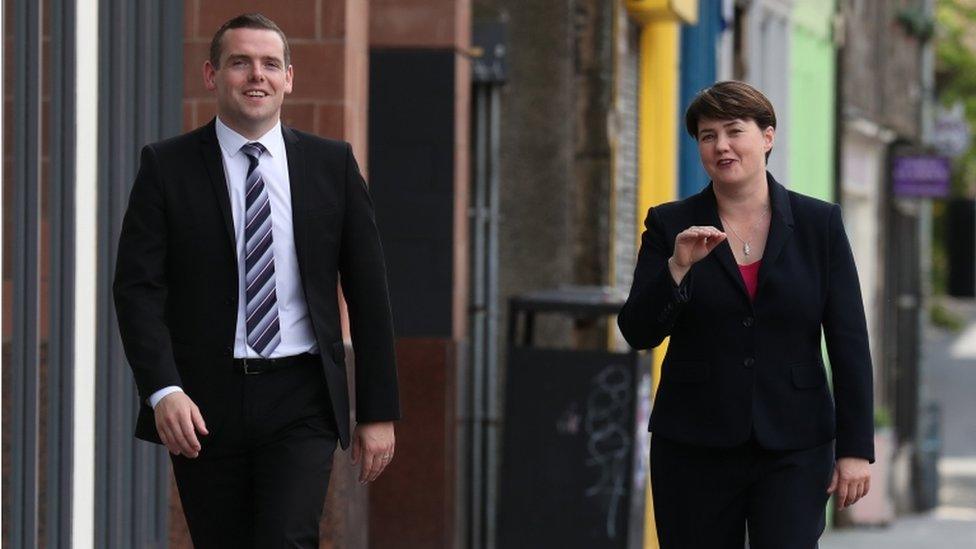
Douglas Ross takes over from Ruth Davidson in leading the Scottish Conservatives charge at First Minister's Questions in the Scottish Parliament
Labour's Anas Sarwar has generally escaped blame for his party's worst ever Holyrood result - returning 22 MSPs - having only been leader for ten weeks by the time of the election.
Mr Sarwar's expected to announce Labour's front bench early next week.
Having been reduced to 4 seats at Holyrood, Willie Rennie's Liberal Democrats have lost influence and speaking time in parliament.
The party will have to work harder to be noticed which helps explain why Mr Rennie stood for first minister and why his party opposed the appointment of constitution secretary, Angus Robertson.
Green shoots
By contrast, the Greens - under the joint leadership of Patrick Harvie and Lorna Slater - have never had a bigger group at Holyrood.
That remains the case even after the loss of one of their 8 MSPs, Alison Johnstone, to the political neutrality of the chair.
As presiding officer, Ms Johnstone has the casting vote in a parliament where the government and combined opposition are tied with 64 votes each.
The Greens' co-leaders have taken two of the biggest spokesperson roles. Patrick Harvie will cover finance and the constitution, while Lorna Slater will be the party's spokeswoman for economic recovery.
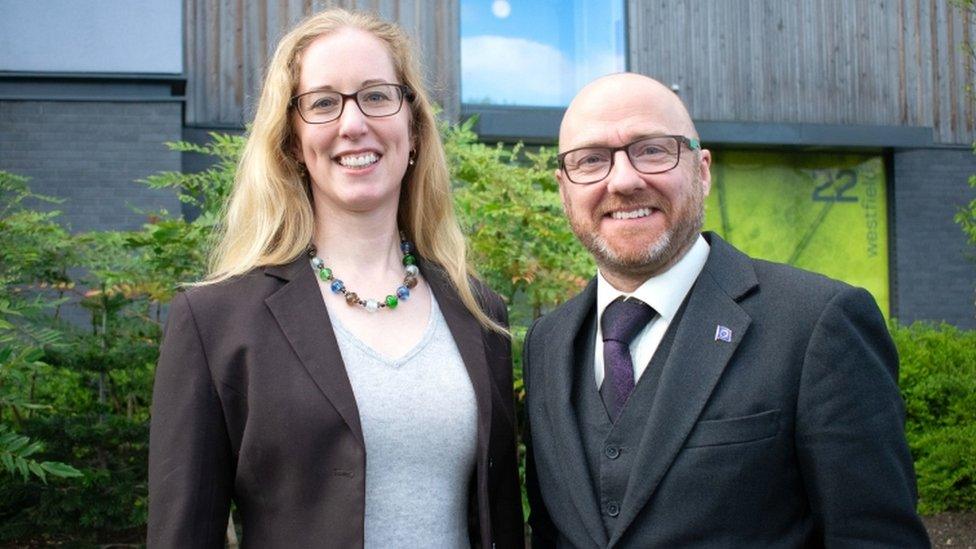
Lorna Slater is an MSP for the first time while fellow co-leader Patrick Harvie is a Holyrood veteran
The government is going to need help from its rivals to get things done.
That is why Ms Sturgeon began the new term promising to work with other parties, to build consensus and to "listen to and adopt good ideas wherever they come from".
In that spirit, there are to be cross-party talks on Covid recovery next week as this fourth term SNP administration and the wider parliament get to work on the huge challenges they face.
- Published10 May 2021
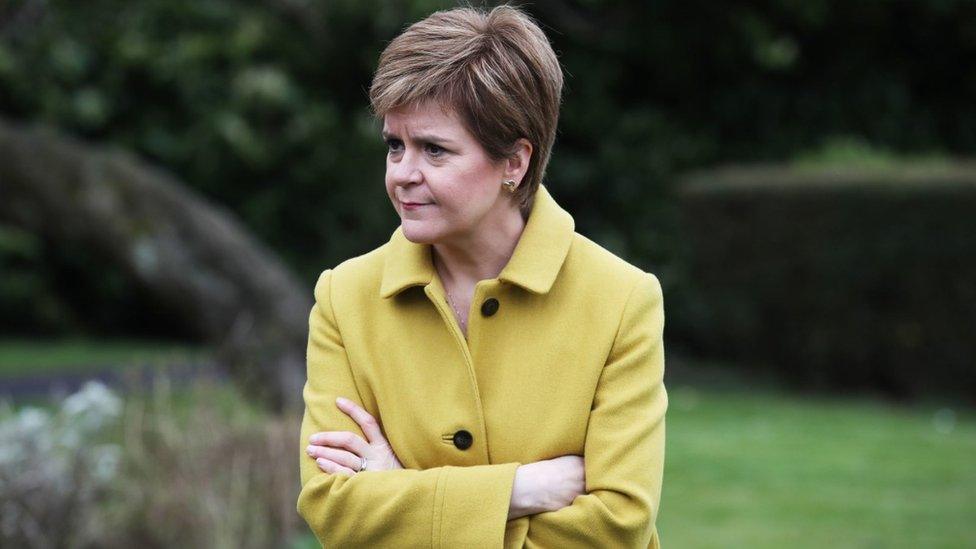
- Published19 May 2021
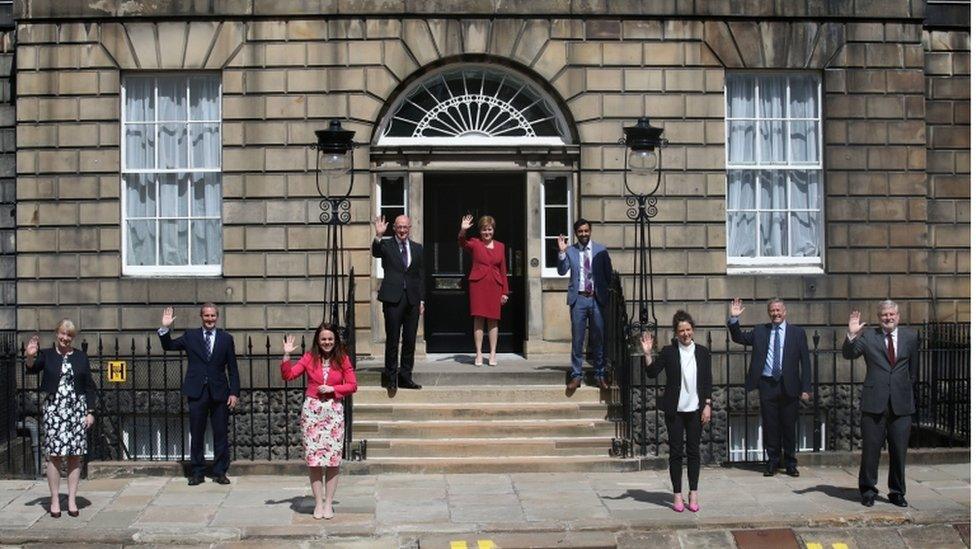
- Published10 May 2021
